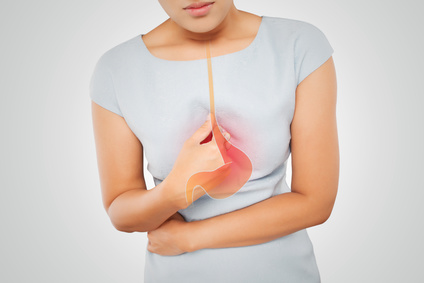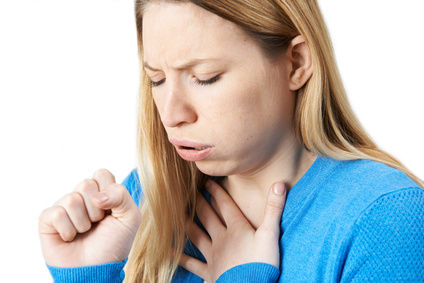Acid Cough – Causes, Other Symptoms and Treatment
Gastroesophageal reflux, also commonly referred to as acid reflux, is the most common digestive complaint. Most of us associate it with heartburn. While heartburn is the most common symptom of acid reflux, it can sometimes not be present. Other reflux symptoms can then be mistaken for other conditions, especially rare reflux symptoms. One such symptom that is not often associated with acid reflux is coughing.
What is an acid cough?
An acid cough is any coughing caused by acid reflux, also known as gastroesophageal reflux disease (GERD). The rising stomach acid and enzymes irritates the esophagus where it causes the typical burning chest sensation (heartburn). It is more likely to result in a cough when the acid reaches the throat or even the lower airways in rare instances. This type of cough is usually shallow and dry but a more severe and even a productive (“wet”) cough can arise when acid enters the airways and even reached the lungs.
The cause of a cough on its own can be difficult to differentiate without other symptoms being present. A cough that arises with heartburn, especially when it is eased by antacids, is most likely an acid cough. However, it may not always present in this typical manner. It is not uncommon for an acid cough to be attributed to other causes, like a post nasal drip.
Causes of Acid Cough
An acid cough is a consequence of stomach acid and enzymes irritating the throat and sometimes the lower airways and even the lungs. The stomach is well equipped to withstand the strong acid and powerful digestive enzymes that it produces. These substances are necessary for chemical digestion within the stomach. Normally it is contained within the stomach and gradually released lowed down the gut, into the small intestine.
The lower esophageal sphincter (LES) that lies between the esophagus (gullet or food pipe) and stomach prevents the acid and enzymes from rising into the esophagus. However, the LES can malfunction at times. Once the acid and enzymes enter the esophagus, it irritates the tissue of the esophageal walls. This is often felt as heartburn which is a burning sensation in the chest since the esophagus lies the thoracic activity.
 Once the acid and enzymes reach the throat, additional symptoms may arise. The throat and airways are lined with irritant receptors that can be stimulated by the corrosive acid and enzymes. As a result it may trigger the cough reflex and coughing may ensue. This results in an acid cough. However, the stimulation of these irritant receptors are not the underlying cause of the cough. It is a consequence of tissue irritation and damage by the acid and enzymes.
Once the acid and enzymes reach the throat, additional symptoms may arise. The throat and airways are lined with irritant receptors that can be stimulated by the corrosive acid and enzymes. As a result it may trigger the cough reflex and coughing may ensue. This results in an acid cough. However, the stimulation of these irritant receptors are not the underlying cause of the cough. It is a consequence of tissue irritation and damage by the acid and enzymes.
It is therefore important to consider the causes of gastroesophageal reflux disease (GERD) which is also known as acid reflux. The underlying cause of acid reflux is a weak or malfunctioning lower esophageal sphincter. Read more on the causes of acid reflux. Certain factors may increase the risk of acid reflux. This includes:
- Any cause of delayed gastric emptying.
- Diseases that affect the LES from closing fully.
- Hiatal hernia
- Increased abdominal pressure as may be seen with obesity and pregnancy.
There are also various factors that can aggravate acid reflux and therefore increase the chance of coughing.
- Alcohol consumption
- Caffeinated beverages
- Certain foods like greasy or spicy meals.
- Overeating
- Pressure on the abdomen, especially after a large meal.
- Smoking
Signs and Symptoms
A cough is a symptom but on its own it does not clearly indicate the underlying cause. Therefore other symptoms need to be assessed to identify the cause of a cough before labeling it as an acid cough. It is not uncommon for the other acid reflux symptoms to accompany an acid cough. This may include:
- Heartburn and even chest pain
- Nausea and sometimes regurgitation
- Excessive saliva (water brash)
- Loss of appetite
- Throat irritation or pain
- Sour taste in the mouth
Symptoms tend to worsen after meals, when lying down an in the early parts of the morning when stomach acid secretion tends to increase. It is important to note that acid reflux may occur with little to no symptoms. This is known as silent acid reflux. Coughing may therefore be the only symptom without the characteristic heartburn, nausea and other symptoms.
Treatment of Acid Cough
As with any condition, treatment should be directed at the underlying cause. Therefore acid reflux treatment needs to be considered. This includes a combination of medication as well as dietary changes.
- Antacids neutralize the stomach acid and can provide symptomatic relief.
- Acid-suppressing drugs like proton pump inhibitors reduces acid secretion.
- LES-strengthening drugs which reduce the relaxation of the lower esophageal sphincter.
Surgery is sometimes required in severe causes of acid reflux. This is only considered when the reflux persists despite medication and dietary changes. These surgical procedures tighten the lower esophageal sphincter (LES).
Diet and Lifestyle
The following dietary and lifestyle measures can be helpful in reducing and managing acid reflux.
- Do not overeat. Large meals should be avoided and it is important to stop eating when full. Rather eat small meals more often than a few large meals.
- Limit alcohol and caffeine intake. Individual tolerance may vary and consumption should be limited. These substances should be avoided altogether in severe acid reflux.
- Avoid trigger foods. Fatty and spicy meals as well as any food that triggers or worsens acid reflux should be avoided.
- Do not lie flat after eating. Stay upright by sitting, standing or walking immediately after a meal. The last meal for the day should be consumed at least 2 hours before bedtime.
- Physical activity after meals can help. Moderate physical activity like walking can aid with gastric emptying and reduce acid reflux.
- Elevate the head of the bed. A slight elevation of the head of a bed an help limit reflux as gravity will increase the resistance of acid and enzymes entering the esophagus.
- Lose weight and maintain a healthy weight. Body weight and particularly abdominal obesity are important factors in persistent and recurrent acid reflux.
- Wear loose fitting clothes. This will reduce the pressure on the abdomen which can contribute to acid reflux.






